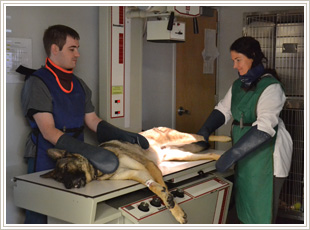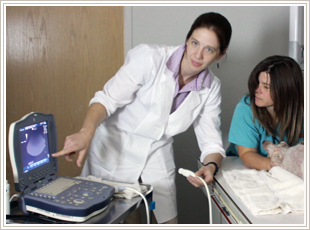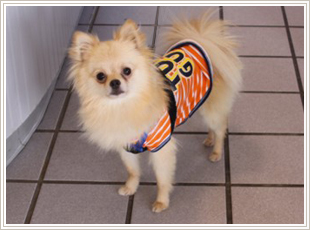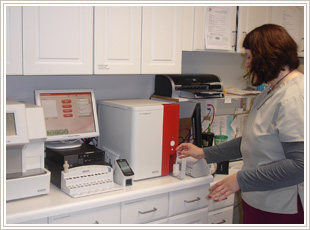Diagnostic Services
 Radiographs
Radiographs
Radiographs (X-rays) are extremely helpful for diagnosing and monitoring many medical and surgical conditions. X-rays are useful in examining your pet’s bones, lungs, heart, abdomen, oral cavity and other areas of the body. An X-ray can spot a fractured bone, detect tumors, help with the diagnosis of heartworm disease or locate an obstruction or foreign body in your pet's intestine or stomach. When used in conjunction with other diagnostic procedures like ultrasound, X-rays can accurately diagnose problems, making treatment faster and easier for your pet and your veterinarian.
Community Animal Hospital uses the latest in radiographic equipment as part of your pet’s diagnostic care. Most radiographs are interpreted immediately by our experienced veterinarians, but in some complicated cases we will send studies out for review by a specialist.
 Ultrasound
Ultrasound
Ultrasound is a pain-free, totally non-invasive technique that uses high-frequency sound waves to produce a real-time image of your pet’s internal organs. Often considered more exact than radiographs, ultrasound provides a movie of what is happening inside your pet’s body.
It is particularly useful in viewing your pet's abdominal organs including the spleen, kidneys, liver, and gallbladder. It can also be used to evaluate heart functions, bladder scans and other areas such as the thyroid glands, testicles and mammary glands.
Ultrasound also works well in conjunction with other diagnostic tools and a wide range of diagnostic procedures. For example, if an X-ray shows a lesion on your pet, an ultrasound can determine the origin of the lesion and whether it has spread elsewhere in your pet’s body. Using the ultrasound image as a guide, surgical biopsies can be obtained without major surgery and your pet can often go home the same day. Ultrasounds are typically not stressful for your pet and take anywhere from 30 to 60 minutes to perform.
Community Animal Hospital uses state-of-the-art ultrasound technologies and is up-to-date on a wide range of ultrasound-assisted procedures, which includes pregnancy, abdominal, biopsy-guided, and routine studies.
 Upper and Lower GI Endoscopy
Upper and Lower GI Endoscopy
Veterinary endoscopy aids in the diagnosis and treatment of problems occurring in the upper and lower gastrointestinal tracts by allowing for a more complete examination of these areas of the body. In particular, this type of scope enables accurate and faster diagnosis of a range of gastrointestinal disorders, cancerous growths, polyps, and other problems.
The endoscope is also useful in obtaining samples of potentially infected or cancerous material and serves as the visual aid during a biopsy, allowing the doctor to obtain the best sample for evaluation. This helps diagnose malignancies in the gastrointestinal tract as well as gastrointestinal disorders such as Inflammatory Bowel Disease.
Endoscopes are also very helpful in the removal of foreign bodies, which are objects swallowed by an animal that cannot pass through their digestive system. The endoscope allows better vision of the digestive tract so these objects may be removed without major surgery.
 Our Lab
Our Lab
Performing preventative medicine as well as diagnosing emergent internal health issues requires the ability to run a wide range of laboratory tests on blood, urine, feces, and biopsied tissue. With laboratory tests we can make an accurate diagnosis or assessment of your pet’s health.
At Community Animal Hospital we have a complete in-house laboratory that allows us to perform a range of studies that include blood chemistry, heartworm and tick disease testing, feline leukemia and immunodeficiency testing, and more. Often, we are able to receive results within minutes.





